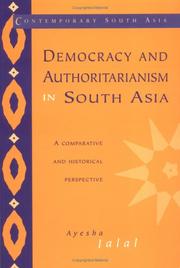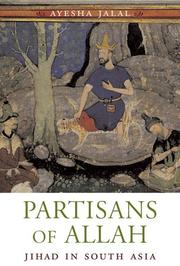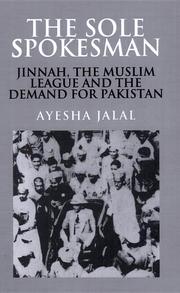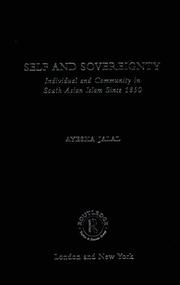| Listing 1 - 10 of 18 | << page >> |
Sort by
|

ISBN: 0521472717 0521478626 0511559372 Year: 1995 Volume: 1 Publisher: Cambridge : Cambridge University Press,
Abstract | Keywords | Export | Availability | Bookmark
 Loading...
Loading...Choose an application
- Reference Manager
- EndNote
- RefWorks (Direct export to RefWorks)
In a comparative and historical study of the interplay between democratic politics and authoritarian states in South Asia, Ayesha Jalal explains how a shared colonial legacy led to apparently contrasting patterns of political development - democracy in India and authoritarianism in Pakistan and Bangladesh. The analysis shows how, despite differences in form, central political authority in each state came to confront similar threats from regional and linguistic dissidence, religious and sectarian strife, as well as class and caste conflicts. By comparing state structures and political processes, the author evaluates and redefines democracy, citizenship, sovereignty and the nation-state, arguing for a more decentralized governmental structure. This original and provocative study will challenge students and scholars in the field to rethink traditional concepts of democracy and authoritarianism in South Asia.
Politics --- Political philosophy. Social philosophy --- South Asia --- 812 Ideologie --- 813 Methodologie --- 815 Geschiedenis --- 826 Imperialisme, Kolonialisme --- 841 Politiek Bestel --- 841.1 Democratisering --- 841.3 Politieke bewegingen --- 841.5 Bestuur en beleid --- 845 Religie --- 883.5 Zuid-Azië --- Asia [South ] --- Politics and government --- Politics and government. --- Social Sciences --- Political Science
Book
ISBN: 1400846684 0691153620 9780691153629 9781400846689 1299051359 9781299051355 Year: 2013 Publisher: Princeton, NJ
Abstract | Keywords | Export | Availability | Bookmark
 Loading...
Loading...Choose an application
- Reference Manager
- EndNote
- RefWorks (Direct export to RefWorks)
Saadat Hasan Manto (1912-1955) was an established Urdu short story writer and a rising screenwriter in Bombay at the time of India's partition in 1947, and he is perhaps best known for the short stories he wrote following his migration to Lahore in newly formed Pakistan. Today Manto is an acknowledged master of twentieth-century Urdu literature, and his fiction serves as a lens through which the tragedy of partition is brought sharply into focus. In The Pity of Partition, Manto's life and work serve as a prism to capture the human dimension of sectarian conflict in the final decades and immediate aftermath of the British raj. Ayesha Jalal draws on Manto's stories, sketches, and essays, as well as a trove of his private letters, to present an intimate history of partition and its devastating toll. Probing the creative tension between literature and history, she charts a new way of reconnecting the histories of individuals, families, and communities in the throes of cataclysmic change. Jalal brings to life the people, locales, and events that inspired Manto's fiction, which is characterized by an eye for detail, a measure of wit and irreverence, and elements of suspense and surprise. In turn, she mines these writings for fresh insights into everyday cosmopolitanism in Bombay and Lahore, the experience and causes of partition, the postcolonial transition, and the advent of the Cold War in South Asia. The first in-depth look in English at this influential literary figure, The Pity of Partition demonstrates the revelatory power of art in times of great historical rupture.
India-Pakistan Conflict, 1947-1949. --- Authors, Urdu --- Short stories, Urdu --- Narration (Rhetoric) --- History and criticism. --- Political aspects --- History --- Manṭo, Saʻādat Ḥasan, --- Criticism and interpretation. --- Political and social views. --- India --- South Asia --- In literature. --- Narrative (Rhetoric) --- Narrative writing --- India-Pakistan War, 1947-1949 --- Indo-Pakistan Conflict, 1947-1949 --- Kashmir War, 1947-1949 --- Pakistan-India Conflict, 1947-1949 --- Hasan, Saadat --- Saʻādat Ḥasan Manṭo, --- Minṭū, Saʻādat Ḥasan, --- Saʻādat Ḥasan Minṭū, --- Minṭū, --- Saadat Hassan Manto, --- Manto, Saadat Hassan, --- Sadat Hasan Manto, --- Manto, Sadat Hasan, --- Sādata Hasana Maṇṭo, --- Maṇṭo, Sādata Hasana, --- Maṇṭṭō, Cātat Hacan̲, --- Cātat Hacan̲ Maṇṭṭō, --- سعادت حسن منٹو --- سعادت حسن منڻو --- منتو، سدت هسن، --- منتو، سعادت حسن، --- منٹو، سعادت حسن --- منٹو، سعادت حسن، --- Manṭo, --- منٹو، --- Asia, South --- Indian Sub-continent --- Indian Subcontinent --- Southern Asia --- Orient --- Rhetoric --- Discourse analysis, Narrative --- Narratees (Rhetoric) --- Asia, Southern --- Authors, Urdu. --- Literature. --- Short stories, Urdu. --- Political aspects. --- Manṭo, Saʻādat Ḥasan, --- India-Pakistan Conflict (1947-1949). --- Partition of India (1947). --- 1900-1999. --- India. --- South Asia. --- منتو، سعادت حسن, --- منٹو، سعادت حسن, --- سعادت حسن منٹو, --- منٹو,
Book
ISBN: 1134599382 0203189639 0203186249 1280354666 9780203189634 1134599374 Year: 2002 Publisher: New York Routledge
Abstract | Keywords | Export | Availability | Bookmark
 Loading...
Loading...Choose an application
- Reference Manager
- EndNote
- RefWorks (Direct export to RefWorks)
Self and Sovereignty surveys the role of individual Muslim men and women within India and Pakistan from 1850 through to decolonisation and the partition period.Commencing in colonial times, this book explores and interprets the historical processes through which the perception of the Muslim individual and the community of Islam has been reconfigured over time. Self and Sovereignty examines the relationship between Islam and nationalism and the individual, regional, class and cultural differences that have shaped the discourse and politics of Muslim identity. As well as fa

ISBN: 0674039076 9780674039070 9780674028012 0674028015 9780674047365 0674047362 Year: 2009 Publisher: Cambridge, MA
Abstract | Keywords | Export | Availability | Bookmark
 Loading...
Loading...Choose an application
- Reference Manager
- EndNote
- RefWorks (Direct export to RefWorks)
Today, more than ever, jihad signifies the political opposition between Islam and the West. As the line drawn between Muslims and non-Muslims becomes more rigid, Jalal seeks to retrieve the ethical meanings of this core Islamic principle in South Asian history. Drawing on historical, legal, and literary sources, Jalal traces the intellectual itinerary of jihad through several centuries and across the territory connecting the Middle East with South Asia.
Jihad. --- Martyrdom --- Muslim martyrs --- Islam and politics --- Islam --- Politics and Islam --- Political science --- Islamic martyrs --- Martyrs, Islamic --- Martyrs, Muslim --- Martyrs --- Martyrdom (Islam) --- Holy war (Islam) --- Islamic holy war --- Jahad --- Jehad --- Muslim holy war --- War (Islamic law) --- Islam. --- Political aspects

ISBN: 1139239619 1139929976 0511558856 1139936824 1139933639 1139939157 1139929399 1139931660 9781139939157 0521244625 9780521244626 9780511558856 9780511558856 9780521458504 0521458501 Year: 1985 Publisher: Cambridge [Cambridgeshire] New York
Abstract | Keywords | Export | Availability | Bookmark
 Loading...
Loading...Choose an application
- Reference Manager
- EndNote
- RefWorks (Direct export to RefWorks)
In 1940 the All-India Muslim League orchestrated the demand for independent Muslim states in India. Seven years later Pakistan was created amidst a communal holocaust of unprecedented proportions. Concentrating on the All-India Muslim League and its leader, Mohammed Ali Jinnah, The Sole Spokesman assesses the role of religious communalism and provincialism in shaping the movement for Pakistan.
Pakistan movement. --- Muslims --- Political activity --- Jinnah, Mahomed Ali, --- Mahomed Ali Jinnah, --- Jinnah, Muhammad ʻAlī, --- Muhammad ʻAlī Jinnah, --- Jinnah, Mohammad Ali, --- Mohammad Ali Jinnah, --- Quaid-i-Azam, --- Jinnah, M. A. --- Jinnah, Mohammed Ali, --- Mohammed Ali, --- Jinnah, Mohomed Ali, --- Mohomed Ali Jinnah, --- Jinnah, Muhammed Ali, --- Muhammed Ali Jinnah, --- Qāʼīd-e Aʻẓam, --- Qāʼid-i Aʻẓam, --- Jinnā, Mahammada Āli, --- Mahammada Āli Jinnā, --- Kaid-i Azam, --- Dzhinna, Mukhammad Ali, --- Mukhammad Ali Dzhinna, --- ،قائد اعظم --- Jināḥ, Muḥammad ʻAlī, --- Jinna, Mahamad Ali, --- جناح، محمد على، --- ،محمد على جناح --- All-India Muslim League --- Muslim League of India --- Moslem League of India --- All-India Moslem League --- Musulʹmanskai︠a︡ liga --- Muslim League (India) --- Muslima Līga (India) --- AIML --- History. --- Social Sciences --- Political Science --- Pakistan movement --- All-India Muslim League - History --- Jinnah, Mahomed Ali, - 1876-1948
Book
ISBN: 9780674052895 9780674979833 Year: 2017 Publisher: Cambridge, Mass. The Belknap Press of Harvard University Press
Abstract | Keywords | Export | Availability | Bookmark
 Loading...
Loading...Choose an application
- Reference Manager
- EndNote
- RefWorks (Direct export to RefWorks)

ISBN: 0415220785 Year: 2000 Publisher: London : Routledge,
Abstract | Keywords | Export | Availability | Bookmark
 Loading...
Loading...Choose an application
- Reference Manager
- EndNote
- RefWorks (Direct export to RefWorks)
Book
ISBN: 0674744993 0674735854 Year: 2014 Publisher: Cambridge, MA : Harvard University Press,
Abstract | Keywords | Export | Availability | Bookmark
 Loading...
Loading...Choose an application
- Reference Manager
- EndNote
- RefWorks (Direct export to RefWorks)
Established as a homeland for India's Muslims in 1947, Pakistan has had a tumultuous history that has unfolded in the vortex of dire regional and international conflicts. Beset by assassinations, coups, ethnic strife, and the breakaway of Bangladesh in 1971, the country has found itself too often contending with religious extremism and military authoritarianism. Now, in a probing biography of her native land amid the throes of global change, Ayesha Jalal provides an insider's assessment of how this nuclear-armed Muslim nation evolved as it did and explains why its dilemmas weigh so heavily on prospects for peace in the region. Attentive to Pakistan's external relations as well as its internal dynamics, Jalal shows how the vexed relationship with the United States, border disputes with Afghanistan in the west, and the conflict with India over Kashmir in the east have played into the hands of the generals who purchased security at the cost of strong democratic institutions. Combined with domestic ethnic and regional rivalries, such pressures have created a siege mentality that encourages military domination and militant extremism. Since 9/11, the country has been widely portrayed as a breeding ground for Islamic terrorism. Assessing the threats posed by Al-Qaeda and the Taliban as American troops withdraw from Afghanistan, Jalal contends that the battle for Pakistan's soul is far from over. Her definitive biography reveals how pluralism and democracy continue to struggle for a place in this Muslim homeland, where they are so essential to its future.
Civil-military relations --- Democracy --- Islam and politics --- Pakistan --- History. --- Politics and government.
Book
ISBN: 9780674735859 0674735854 0674744993 9780674744998 9780674052895 0674052897 Year: 2014 Publisher: Cambridge, MA
Abstract | Keywords | Export | Availability | Bookmark
 Loading...
Loading...Choose an application
- Reference Manager
- EndNote
- RefWorks (Direct export to RefWorks)
Book
ISBN: 9780511559372 9780521472715 9780521478625 Year: 1995 Publisher: Cambridge Cambridge University Press
Abstract | Keywords | Export | Availability | Bookmark
 Loading...
Loading...Choose an application
- Reference Manager
- EndNote
- RefWorks (Direct export to RefWorks)
| Listing 1 - 10 of 18 | << page >> |
Sort by
|

 Search
Search Feedback
Feedback About UniCat
About UniCat  Help
Help News
News